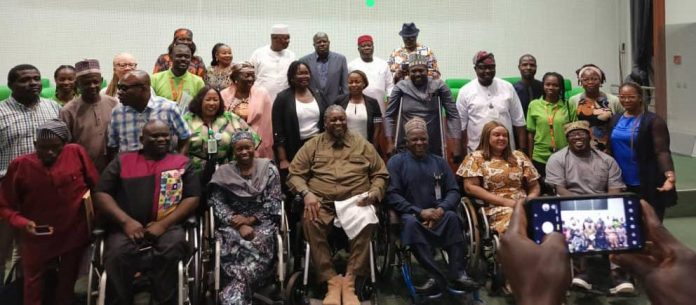The House of Representatives Committee on Persons with Disabilities has expressed deep concerns over the continued non-compliance with the Discrimination Against Persons with Disabilities (Prohibition) Act, 2018—popularly known as the Disability Act—by Ministries, Departments, and Agencies (MDAs). Despite the passage of the Act, which aims to protect the rights and improve the quality of life for persons with disabilities (PWDs), many MDAs have failed to implement its provisions, leaving the disability community underserved in critical areas of daily life.
This sentiment was echoed during an investigative hearing held on Monday by the House Committee on Persons with Disabilities, aimed at examining the level of compliance by MDAs. Stakeholders present at the hearing, including government officials, disability advocates, and representatives from civil society, decried the inertia displayed by public institutions in aligning their policies, programs, and infrastructure with the provisions of the Act.
MDAs Ignoring Mandates and Deadlines
In his opening address, the Chairman of the Committee, Hon. Dr. Ayinla Bashiru Dawodu, stated that the investigation was initiated following a House resolution to examine how well MDAs have complied with the Act. He said the hearing would critically assess key areas such as accessibility, employment, and disability inclusion within the policies, plans, and programs of MDAs.
Dawodu emphasized that the Act’s provisions came with a grace period to allow government institutions to align themselves with its requirements. However, the deadline for compliance, which expired in January 2024, has been largely ignored by most MDAs. “We are disappointed that, despite the time given to transition, many MDAs have failed to take meaningful steps toward implementation,” he lamented.
The Chairman stressed that the absence of compliance has hindered PWDs from enjoying essential rights, including equal access to education, employment, healthcare, and public services.
“We Must Avoid the Mistakes of the Past” — House Leader
Adding his voice to the concerns, the Leader of the House of Representatives, Prof. Julius Ihonvbere, highlighted the urgent need for the government to act decisively in enforcing the Disability Act. He quoted a recent report by the World Health Organization (WHO), which estimates that Nigeria is home to around 20 million persons with disabilities, representing approximately 3.9% of the global population of PWDs.
“This is a major challenge, not just for the government but for the entire country. We cannot afford to ignore the plight of such a significant portion of our population,” Ihonvbere said. “The need for this engagement has been long overdue. If we do not act now, we risk repeating the mistakes of the past by further alienating a vulnerable group whose contributions are essential to national development.”
The House Leader reiterated that the National Assembly had fulfilled its legislative duty by passing the Disability Act in 2018, which was signed into law by then-President Muhammadu Buhari. He described the Act as a critical piece of legislation intended to safeguard the rights and welfare of PWDs by ensuring their liberty, equal access to education, healthcare, priority in queues and emergencies, and protection from discrimination in workplaces and public institutions.
“Yet, six years after its enactment, many MDAs have either ignored or failed to initiate any steps toward implementing these provisions. If this neglect continues, it will not only hinder our socio-economic development but also reflect poorly on us as a society that lacks empathy and the will to do what is right,” Ihonvbere warned.
Calls for Accountability and Immediate Action
The hearing underscored the need for accountability and enforcement. Stakeholders emphasized that full implementation of the Disability Act is not merely a legal obligation but also a moral imperative to ensure an inclusive society. They argued that the government must lead by example in promoting inclusion, beginning with the MDAs responsible for public service delivery.
Participants at the hearing urged the House of Representatives to hold non-compliant MDAs accountable, recommending sanctions for institutions that continue to disregard the Act. They stressed that without such measures, the goals of the Disability Act—ensuring equity and access to public services for PWDs—would remain elusive.
Beyond Words: Translating Policies Into Action
The Disability Act, stakeholders agreed, represents a critical framework for advancing the rights of persons with disabilities in Nigeria. However, they argued that the focus must now shift from policy rhetoric to concrete action. Disability rights activists at the hearing warned that without political will and deliberate steps toward enforcement, PWDs in Nigeria would continue to face systemic barriers to inclusion.
“We are not asking for favors but for our rights, as enshrined in the Disability Act,” said a representative of one of the advocacy groups in attendance. “It is time for government institutions to walk the talk and create a society where persons with disabilities can live with dignity, free from discrimination.”
The Way Forward
The Committee assured stakeholders of its commitment to follow up on the investigative hearing by engaging the leadership of non-compliant MDAs and recommending measures to ensure swift compliance. The Chairman of the Committee hinted at possible legislative interventions to strengthen enforcement, stating, “We will not relent in holding MDAs accountable. The welfare of persons with disabilities is not negotiable.”
The hearing concluded with a renewed call for all sectors of society to embrace inclusion and ensure that the promise of the Discrimination Against Persons with Disabilities (Prohibition) Act, 2018 is fulfilled in its entirety.
As the debate on disability inclusion intensifies, the outcome of this investigation could set a precedent for future enforcement of laws aimed at protecting the rights of marginalized communities. For Nigeria’s disability community, the hope is that this time, words will translate into action—because their lives, livelihoods, and dignity depend on it.


